Employee Satisfaction's Influence on Organizational Performance
VerifiedAdded on 2023/06/10
|13
|2435
|360
Report
AI Summary
This report investigates the impact of employee satisfaction on organizational performance within the hospitality industry. It begins with an introduction outlining the importance of employee satisfaction for organizational productivity and market position. The research aims to identify key factors influencing employee satisfaction and their impact on organizational development, focusing on employee retention and workplace motivation. The methodology employs a positivist research philosophy with a deductive approach and descriptive research design. Data collection relies on primary data gathered through interviews with managers. The report anticipates findings related to employee satisfaction factors, ethical considerations, and a timeline for the research process. The study explores factors such as appreciation, work-life balance, relationships with colleagues, and financial conditions to enhance employee satisfaction. It also examines the role of organizational development, employee retention, and motivation to achieve success and better organizational performance. The report concludes by summarizing the research process, findings, and opportunities for employee engagement and retention within the hospitality sector.
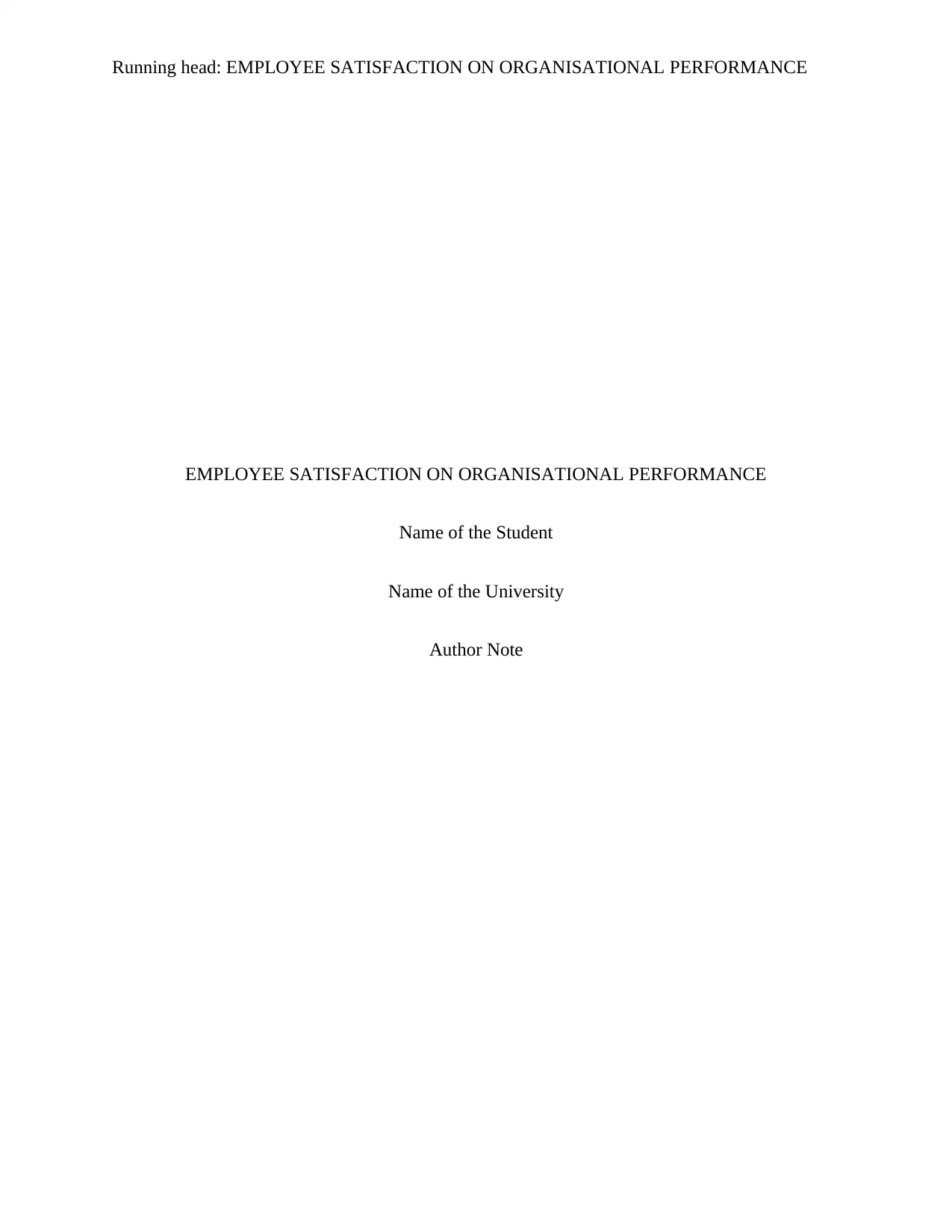
Running head: EMPLOYEE SATISFACTION ON ORGANISATIONAL PERFORMANCE
EMPLOYEE SATISFACTION ON ORGANISATIONAL PERFORMANCE
Name of the Student
Name of the University
Author Note
EMPLOYEE SATISFACTION ON ORGANISATIONAL PERFORMANCE
Name of the Student
Name of the University
Author Note
Paraphrase This Document
Need a fresh take? Get an instant paraphrase of this document with our AI Paraphraser
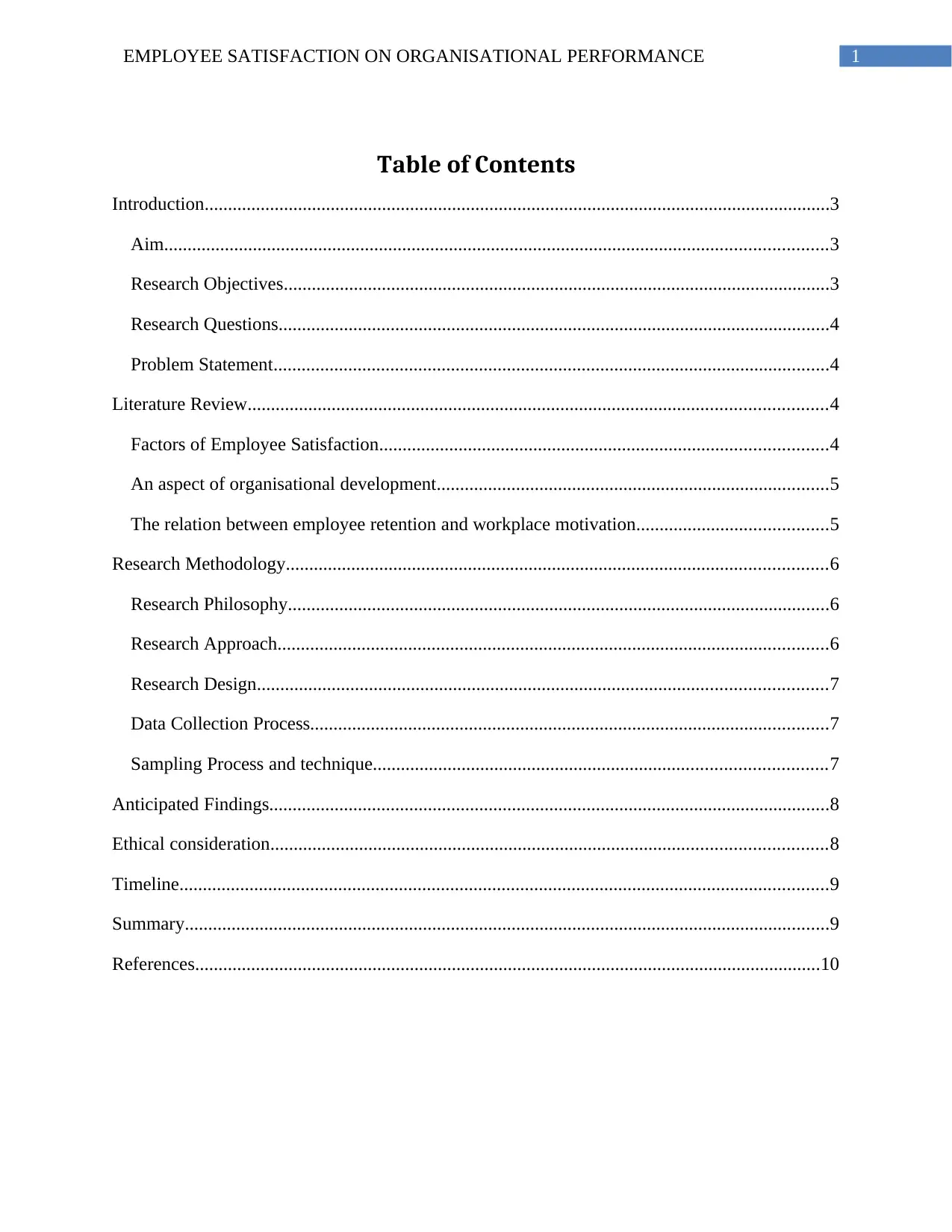
1EMPLOYEE SATISFACTION ON ORGANISATIONAL PERFORMANCE
Table of Contents
Introduction......................................................................................................................................3
Aim..............................................................................................................................................3
Research Objectives.....................................................................................................................3
Research Questions......................................................................................................................4
Problem Statement.......................................................................................................................4
Literature Review............................................................................................................................4
Factors of Employee Satisfaction................................................................................................4
An aspect of organisational development....................................................................................5
The relation between employee retention and workplace motivation.........................................5
Research Methodology....................................................................................................................6
Research Philosophy....................................................................................................................6
Research Approach......................................................................................................................6
Research Design..........................................................................................................................7
Data Collection Process...............................................................................................................7
Sampling Process and technique.................................................................................................7
Anticipated Findings........................................................................................................................8
Ethical consideration.......................................................................................................................8
Timeline...........................................................................................................................................9
Summary..........................................................................................................................................9
References......................................................................................................................................10
Table of Contents
Introduction......................................................................................................................................3
Aim..............................................................................................................................................3
Research Objectives.....................................................................................................................3
Research Questions......................................................................................................................4
Problem Statement.......................................................................................................................4
Literature Review............................................................................................................................4
Factors of Employee Satisfaction................................................................................................4
An aspect of organisational development....................................................................................5
The relation between employee retention and workplace motivation.........................................5
Research Methodology....................................................................................................................6
Research Philosophy....................................................................................................................6
Research Approach......................................................................................................................6
Research Design..........................................................................................................................7
Data Collection Process...............................................................................................................7
Sampling Process and technique.................................................................................................7
Anticipated Findings........................................................................................................................8
Ethical consideration.......................................................................................................................8
Timeline...........................................................................................................................................9
Summary..........................................................................................................................................9
References......................................................................................................................................10
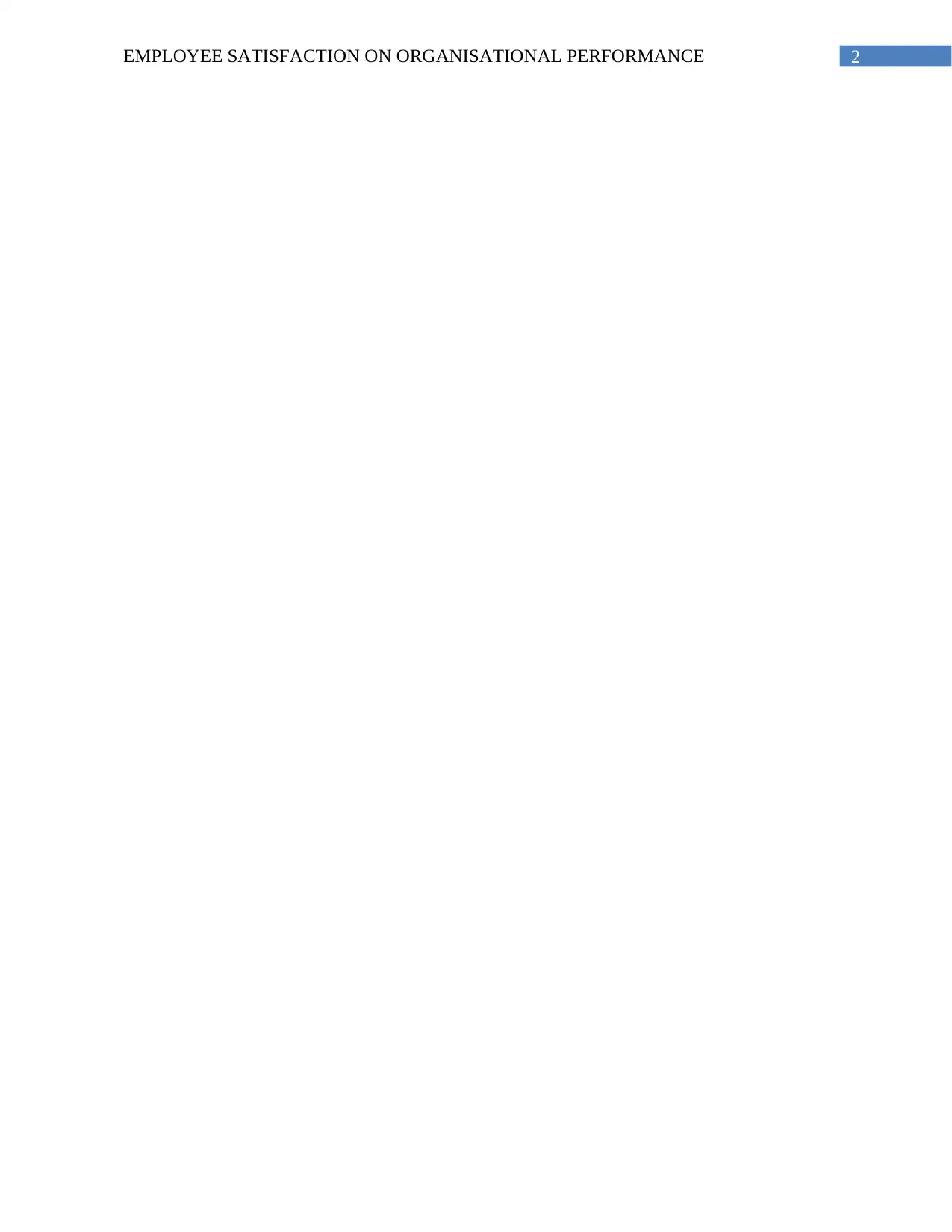
2EMPLOYEE SATISFACTION ON ORGANISATIONAL PERFORMANCE
⊘ This is a preview!⊘
Do you want full access?
Subscribe today to unlock all pages.

Trusted by 1+ million students worldwide
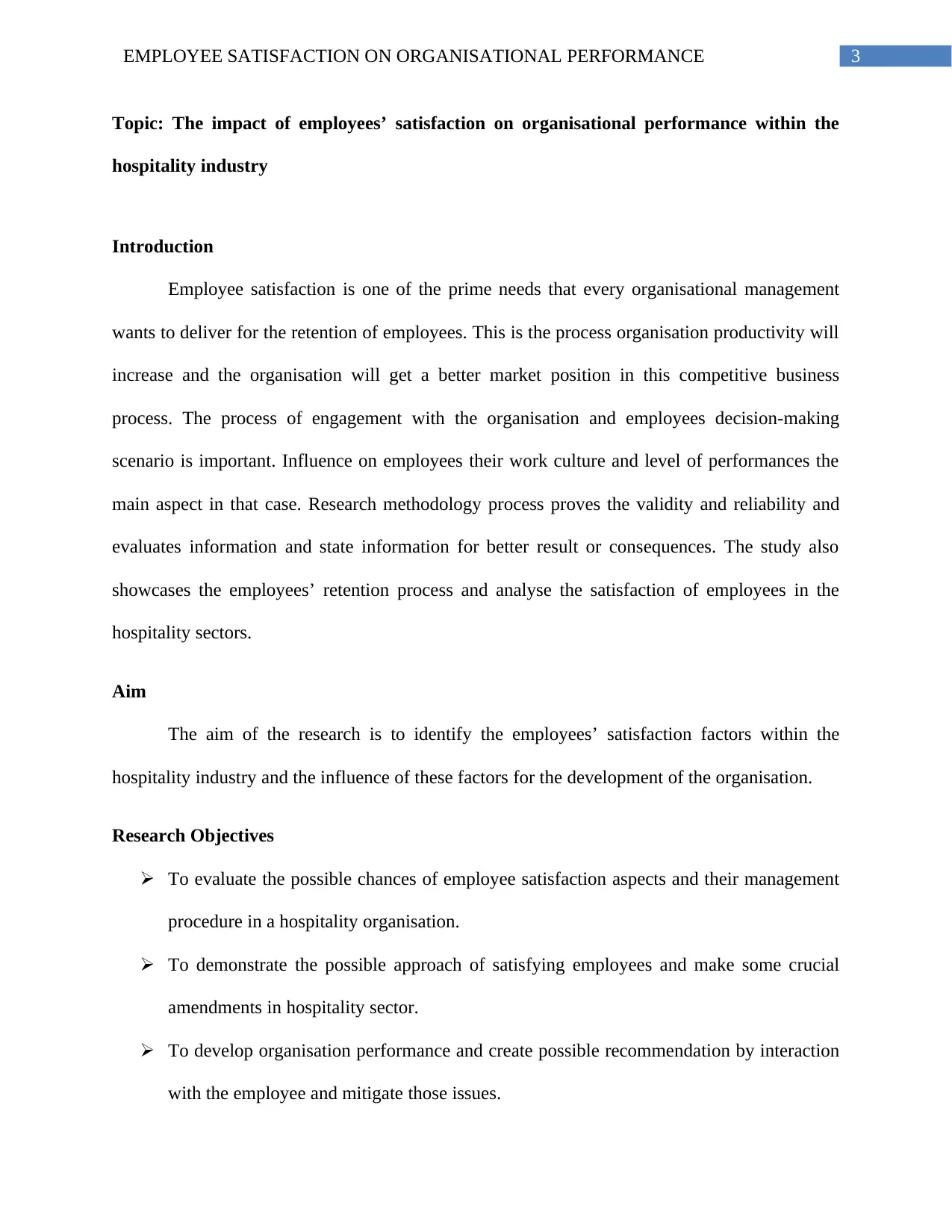
3EMPLOYEE SATISFACTION ON ORGANISATIONAL PERFORMANCE
Topic: The impact of employees’ satisfaction on organisational performance within the
hospitality industry
Introduction
Employee satisfaction is one of the prime needs that every organisational management
wants to deliver for the retention of employees. This is the process organisation productivity will
increase and the organisation will get a better market position in this competitive business
process. The process of engagement with the organisation and employees decision-making
scenario is important. Influence on employees their work culture and level of performances the
main aspect in that case. Research methodology process proves the validity and reliability and
evaluates information and state information for better result or consequences. The study also
showcases the employees’ retention process and analyse the satisfaction of employees in the
hospitality sectors.
Aim
The aim of the research is to identify the employees’ satisfaction factors within the
hospitality industry and the influence of these factors for the development of the organisation.
Research Objectives
To evaluate the possible chances of employee satisfaction aspects and their management
procedure in a hospitality organisation.
To demonstrate the possible approach of satisfying employees and make some crucial
amendments in hospitality sector.
To develop organisation performance and create possible recommendation by interaction
with the employee and mitigate those issues.
Topic: The impact of employees’ satisfaction on organisational performance within the
hospitality industry
Introduction
Employee satisfaction is one of the prime needs that every organisational management
wants to deliver for the retention of employees. This is the process organisation productivity will
increase and the organisation will get a better market position in this competitive business
process. The process of engagement with the organisation and employees decision-making
scenario is important. Influence on employees their work culture and level of performances the
main aspect in that case. Research methodology process proves the validity and reliability and
evaluates information and state information for better result or consequences. The study also
showcases the employees’ retention process and analyse the satisfaction of employees in the
hospitality sectors.
Aim
The aim of the research is to identify the employees’ satisfaction factors within the
hospitality industry and the influence of these factors for the development of the organisation.
Research Objectives
To evaluate the possible chances of employee satisfaction aspects and their management
procedure in a hospitality organisation.
To demonstrate the possible approach of satisfying employees and make some crucial
amendments in hospitality sector.
To develop organisation performance and create possible recommendation by interaction
with the employee and mitigate those issues.
Paraphrase This Document
Need a fresh take? Get an instant paraphrase of this document with our AI Paraphraser
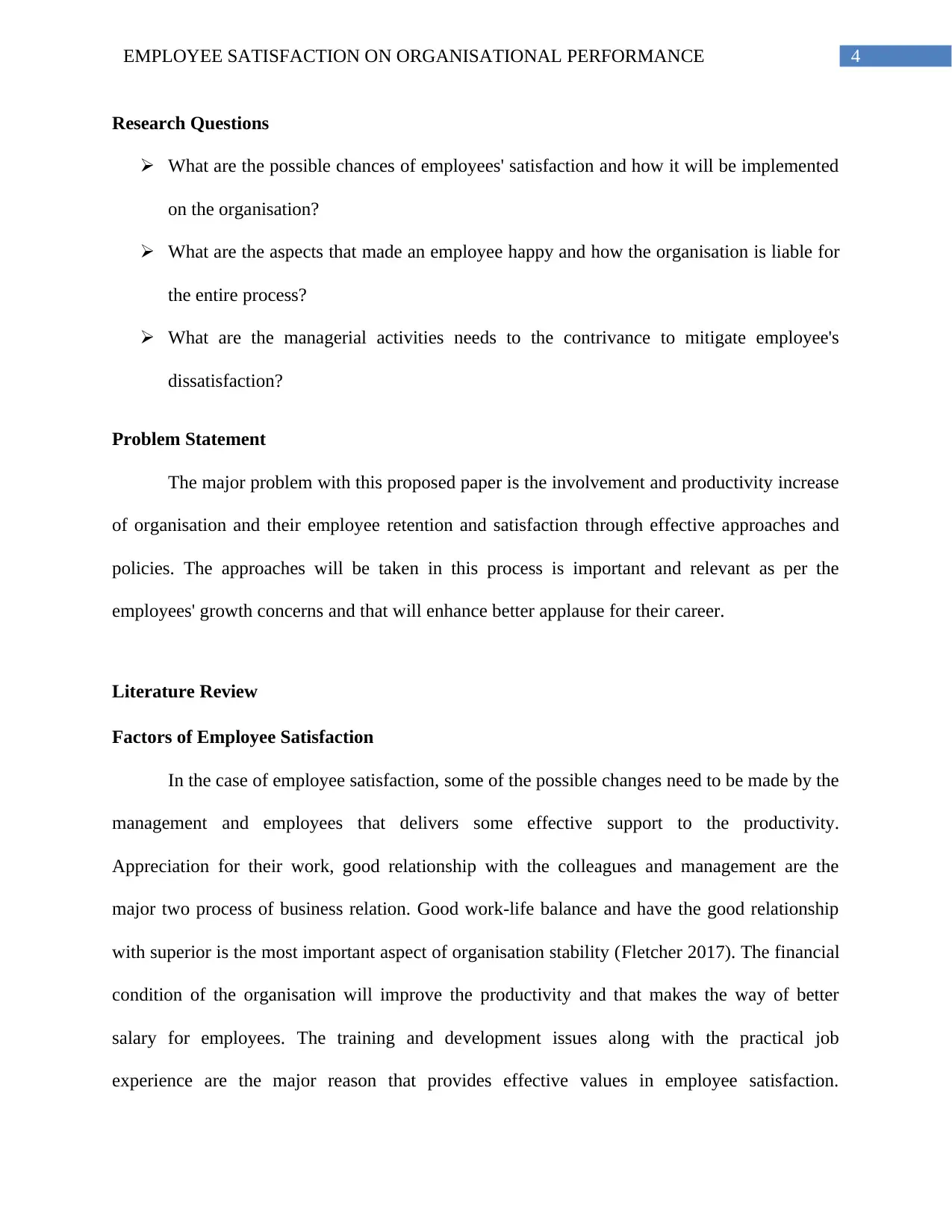
4EMPLOYEE SATISFACTION ON ORGANISATIONAL PERFORMANCE
Research Questions
What are the possible chances of employees' satisfaction and how it will be implemented
on the organisation?
What are the aspects that made an employee happy and how the organisation is liable for
the entire process?
What are the managerial activities needs to the contrivance to mitigate employee's
dissatisfaction?
Problem Statement
The major problem with this proposed paper is the involvement and productivity increase
of organisation and their employee retention and satisfaction through effective approaches and
policies. The approaches will be taken in this process is important and relevant as per the
employees' growth concerns and that will enhance better applause for their career.
Literature Review
Factors of Employee Satisfaction
In the case of employee satisfaction, some of the possible changes need to be made by the
management and employees that delivers some effective support to the productivity.
Appreciation for their work, good relationship with the colleagues and management are the
major two process of business relation. Good work-life balance and have the good relationship
with superior is the most important aspect of organisation stability (Fletcher 2017). The financial
condition of the organisation will improve the productivity and that makes the way of better
salary for employees. The training and development issues along with the practical job
experience are the major reason that provides effective values in employee satisfaction.
Research Questions
What are the possible chances of employees' satisfaction and how it will be implemented
on the organisation?
What are the aspects that made an employee happy and how the organisation is liable for
the entire process?
What are the managerial activities needs to the contrivance to mitigate employee's
dissatisfaction?
Problem Statement
The major problem with this proposed paper is the involvement and productivity increase
of organisation and their employee retention and satisfaction through effective approaches and
policies. The approaches will be taken in this process is important and relevant as per the
employees' growth concerns and that will enhance better applause for their career.
Literature Review
Factors of Employee Satisfaction
In the case of employee satisfaction, some of the possible changes need to be made by the
management and employees that delivers some effective support to the productivity.
Appreciation for their work, good relationship with the colleagues and management are the
major two process of business relation. Good work-life balance and have the good relationship
with superior is the most important aspect of organisation stability (Fletcher 2017). The financial
condition of the organisation will improve the productivity and that makes the way of better
salary for employees. The training and development issues along with the practical job
experience are the major reason that provides effective values in employee satisfaction.
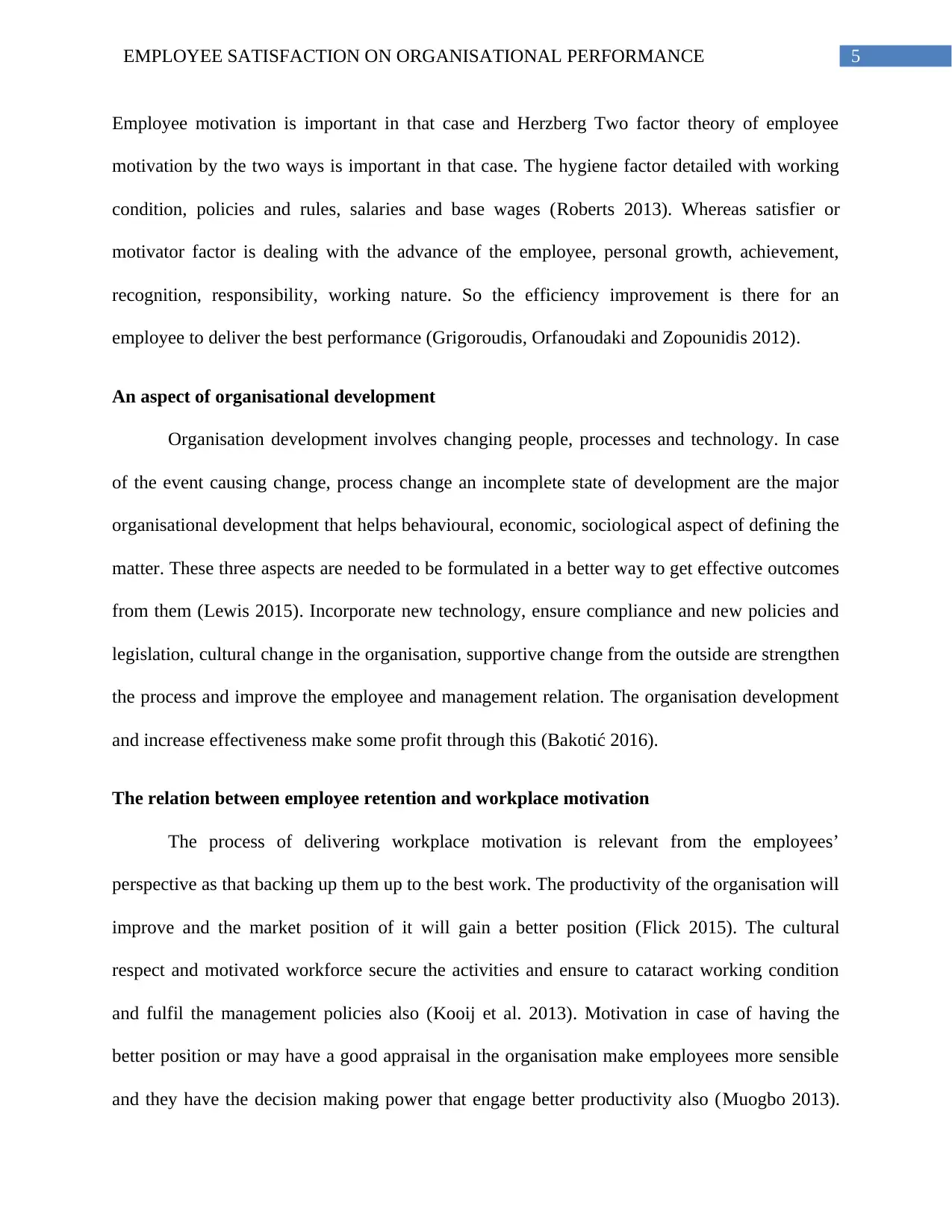
5EMPLOYEE SATISFACTION ON ORGANISATIONAL PERFORMANCE
Employee motivation is important in that case and Herzberg Two factor theory of employee
motivation by the two ways is important in that case. The hygiene factor detailed with working
condition, policies and rules, salaries and base wages (Roberts 2013). Whereas satisfier or
motivator factor is dealing with the advance of the employee, personal growth, achievement,
recognition, responsibility, working nature. So the efficiency improvement is there for an
employee to deliver the best performance (Grigoroudis, Orfanoudaki and Zopounidis 2012).
An aspect of organisational development
Organisation development involves changing people, processes and technology. In case
of the event causing change, process change an incomplete state of development are the major
organisational development that helps behavioural, economic, sociological aspect of defining the
matter. These three aspects are needed to be formulated in a better way to get effective outcomes
from them (Lewis 2015). Incorporate new technology, ensure compliance and new policies and
legislation, cultural change in the organisation, supportive change from the outside are strengthen
the process and improve the employee and management relation. The organisation development
and increase effectiveness make some profit through this (Bakotić 2016).
The relation between employee retention and workplace motivation
The process of delivering workplace motivation is relevant from the employees’
perspective as that backing up them up to the best work. The productivity of the organisation will
improve and the market position of it will gain a better position (Flick 2015). The cultural
respect and motivated workforce secure the activities and ensure to cataract working condition
and fulfil the management policies also (Kooij et al. 2013). Motivation in case of having the
better position or may have a good appraisal in the organisation make employees more sensible
and they have the decision making power that engage better productivity also (Muogbo 2013).
Employee motivation is important in that case and Herzberg Two factor theory of employee
motivation by the two ways is important in that case. The hygiene factor detailed with working
condition, policies and rules, salaries and base wages (Roberts 2013). Whereas satisfier or
motivator factor is dealing with the advance of the employee, personal growth, achievement,
recognition, responsibility, working nature. So the efficiency improvement is there for an
employee to deliver the best performance (Grigoroudis, Orfanoudaki and Zopounidis 2012).
An aspect of organisational development
Organisation development involves changing people, processes and technology. In case
of the event causing change, process change an incomplete state of development are the major
organisational development that helps behavioural, economic, sociological aspect of defining the
matter. These three aspects are needed to be formulated in a better way to get effective outcomes
from them (Lewis 2015). Incorporate new technology, ensure compliance and new policies and
legislation, cultural change in the organisation, supportive change from the outside are strengthen
the process and improve the employee and management relation. The organisation development
and increase effectiveness make some profit through this (Bakotić 2016).
The relation between employee retention and workplace motivation
The process of delivering workplace motivation is relevant from the employees’
perspective as that backing up them up to the best work. The productivity of the organisation will
improve and the market position of it will gain a better position (Flick 2015). The cultural
respect and motivated workforce secure the activities and ensure to cataract working condition
and fulfil the management policies also (Kooij et al. 2013). Motivation in case of having the
better position or may have a good appraisal in the organisation make employees more sensible
and they have the decision making power that engage better productivity also (Muogbo 2013).
⊘ This is a preview!⊘
Do you want full access?
Subscribe today to unlock all pages.

Trusted by 1+ million students worldwide
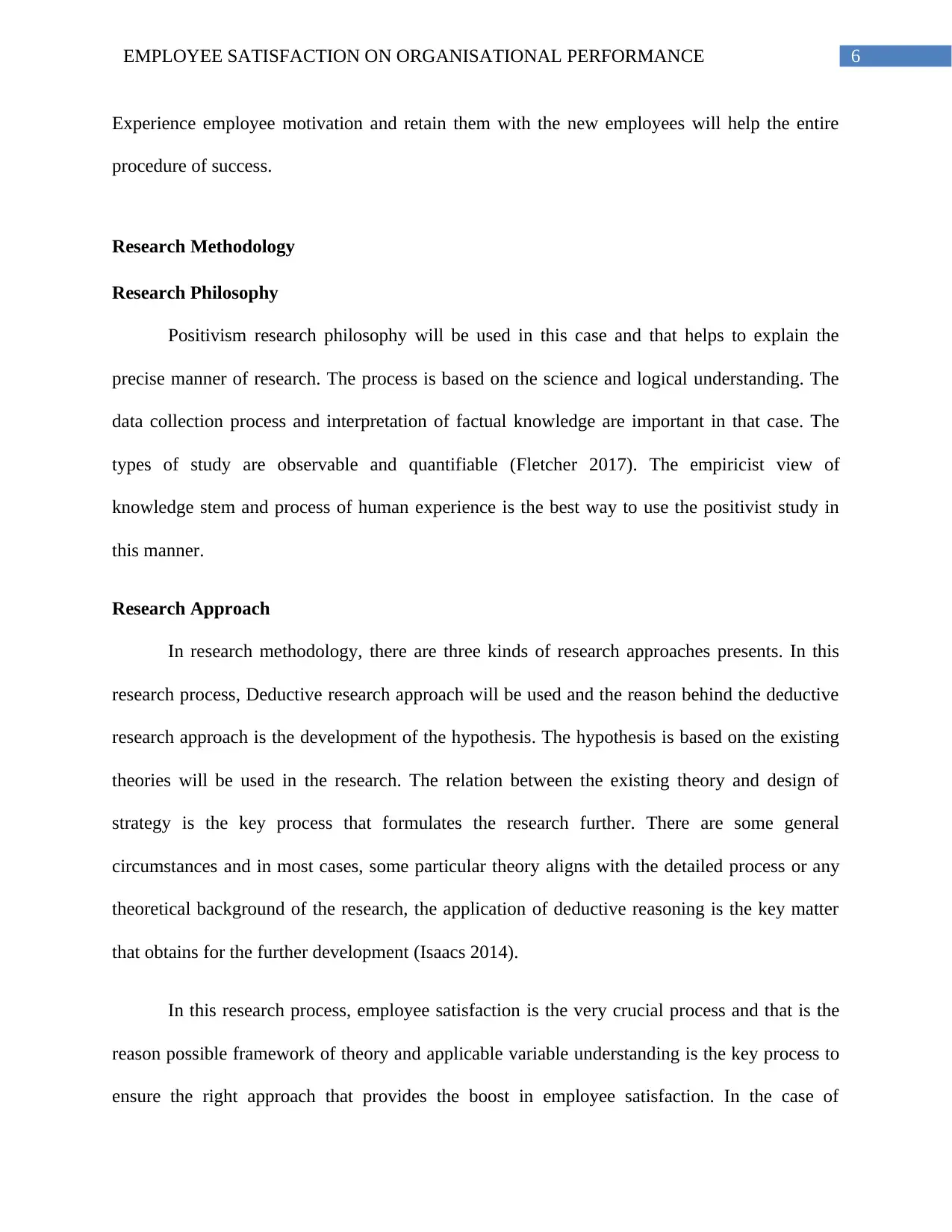
6EMPLOYEE SATISFACTION ON ORGANISATIONAL PERFORMANCE
Experience employee motivation and retain them with the new employees will help the entire
procedure of success.
Research Methodology
Research Philosophy
Positivism research philosophy will be used in this case and that helps to explain the
precise manner of research. The process is based on the science and logical understanding. The
data collection process and interpretation of factual knowledge are important in that case. The
types of study are observable and quantifiable (Fletcher 2017). The empiricist view of
knowledge stem and process of human experience is the best way to use the positivist study in
this manner.
Research Approach
In research methodology, there are three kinds of research approaches presents. In this
research process, Deductive research approach will be used and the reason behind the deductive
research approach is the development of the hypothesis. The hypothesis is based on the existing
theories will be used in the research. The relation between the existing theory and design of
strategy is the key process that formulates the research further. There are some general
circumstances and in most cases, some particular theory aligns with the detailed process or any
theoretical background of the research, the application of deductive reasoning is the key matter
that obtains for the further development (Isaacs 2014).
In this research process, employee satisfaction is the very crucial process and that is the
reason possible framework of theory and applicable variable understanding is the key process to
ensure the right approach that provides the boost in employee satisfaction. In the case of
Experience employee motivation and retain them with the new employees will help the entire
procedure of success.
Research Methodology
Research Philosophy
Positivism research philosophy will be used in this case and that helps to explain the
precise manner of research. The process is based on the science and logical understanding. The
data collection process and interpretation of factual knowledge are important in that case. The
types of study are observable and quantifiable (Fletcher 2017). The empiricist view of
knowledge stem and process of human experience is the best way to use the positivist study in
this manner.
Research Approach
In research methodology, there are three kinds of research approaches presents. In this
research process, Deductive research approach will be used and the reason behind the deductive
research approach is the development of the hypothesis. The hypothesis is based on the existing
theories will be used in the research. The relation between the existing theory and design of
strategy is the key process that formulates the research further. There are some general
circumstances and in most cases, some particular theory aligns with the detailed process or any
theoretical background of the research, the application of deductive reasoning is the key matter
that obtains for the further development (Isaacs 2014).
In this research process, employee satisfaction is the very crucial process and that is the
reason possible framework of theory and applicable variable understanding is the key process to
ensure the right approach that provides the boost in employee satisfaction. In the case of
Paraphrase This Document
Need a fresh take? Get an instant paraphrase of this document with our AI Paraphraser
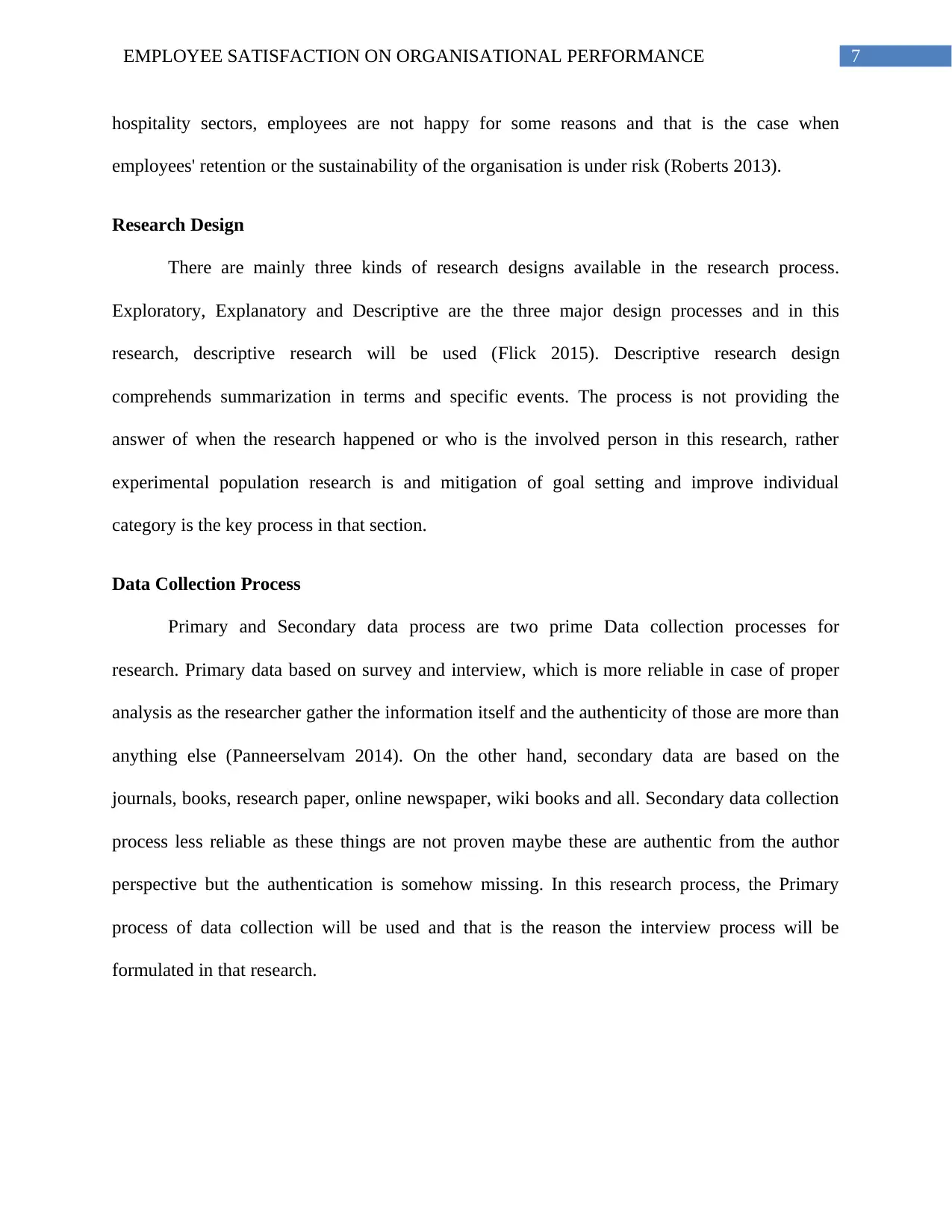
7EMPLOYEE SATISFACTION ON ORGANISATIONAL PERFORMANCE
hospitality sectors, employees are not happy for some reasons and that is the case when
employees' retention or the sustainability of the organisation is under risk (Roberts 2013).
Research Design
There are mainly three kinds of research designs available in the research process.
Exploratory, Explanatory and Descriptive are the three major design processes and in this
research, descriptive research will be used (Flick 2015). Descriptive research design
comprehends summarization in terms and specific events. The process is not providing the
answer of when the research happened or who is the involved person in this research, rather
experimental population research is and mitigation of goal setting and improve individual
category is the key process in that section.
Data Collection Process
Primary and Secondary data process are two prime Data collection processes for
research. Primary data based on survey and interview, which is more reliable in case of proper
analysis as the researcher gather the information itself and the authenticity of those are more than
anything else (Panneerselvam 2014). On the other hand, secondary data are based on the
journals, books, research paper, online newspaper, wiki books and all. Secondary data collection
process less reliable as these things are not proven maybe these are authentic from the author
perspective but the authentication is somehow missing. In this research process, the Primary
process of data collection will be used and that is the reason the interview process will be
formulated in that research.
hospitality sectors, employees are not happy for some reasons and that is the case when
employees' retention or the sustainability of the organisation is under risk (Roberts 2013).
Research Design
There are mainly three kinds of research designs available in the research process.
Exploratory, Explanatory and Descriptive are the three major design processes and in this
research, descriptive research will be used (Flick 2015). Descriptive research design
comprehends summarization in terms and specific events. The process is not providing the
answer of when the research happened or who is the involved person in this research, rather
experimental population research is and mitigation of goal setting and improve individual
category is the key process in that section.
Data Collection Process
Primary and Secondary data process are two prime Data collection processes for
research. Primary data based on survey and interview, which is more reliable in case of proper
analysis as the researcher gather the information itself and the authenticity of those are more than
anything else (Panneerselvam 2014). On the other hand, secondary data are based on the
journals, books, research paper, online newspaper, wiki books and all. Secondary data collection
process less reliable as these things are not proven maybe these are authentic from the author
perspective but the authentication is somehow missing. In this research process, the Primary
process of data collection will be used and that is the reason the interview process will be
formulated in that research.
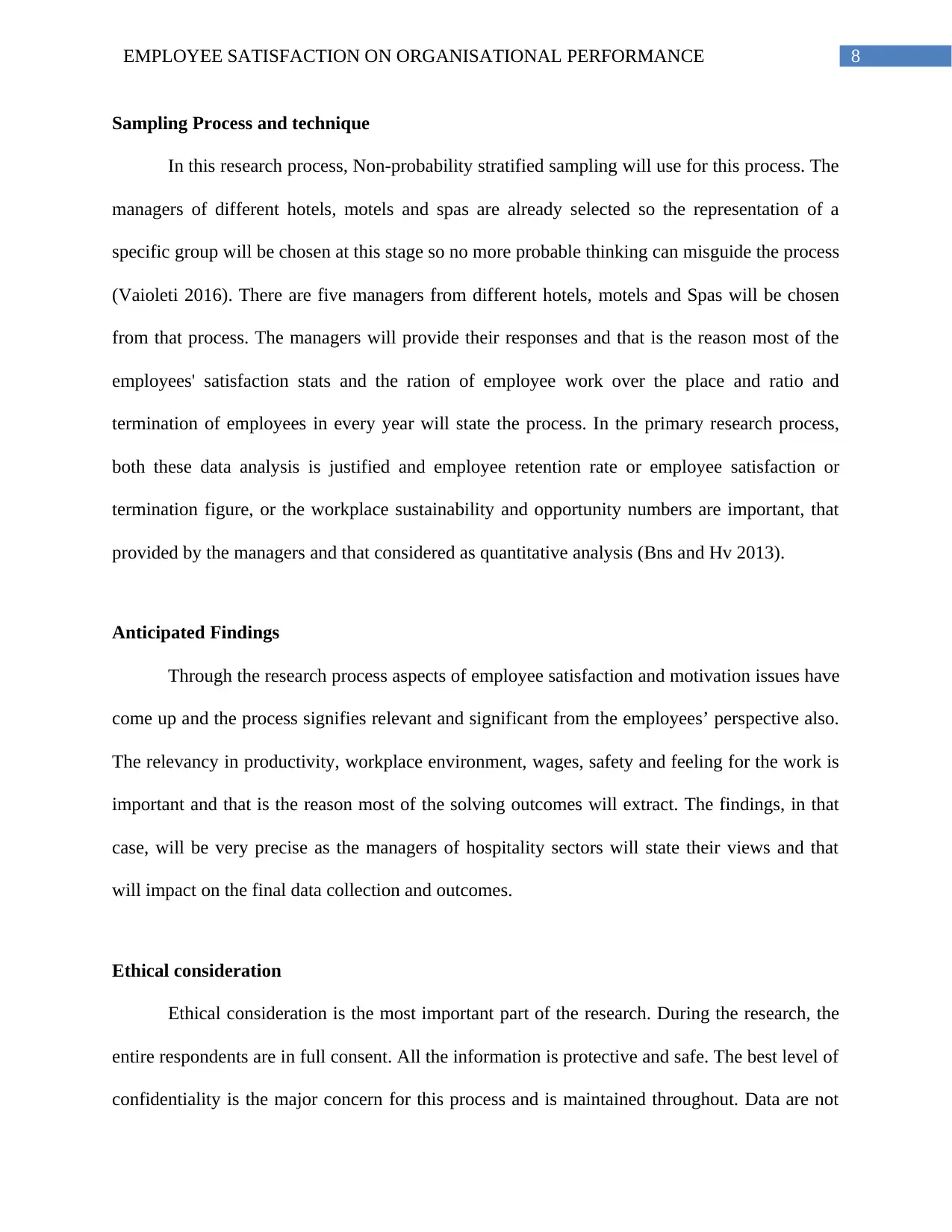
8EMPLOYEE SATISFACTION ON ORGANISATIONAL PERFORMANCE
Sampling Process and technique
In this research process, Non-probability stratified sampling will use for this process. The
managers of different hotels, motels and spas are already selected so the representation of a
specific group will be chosen at this stage so no more probable thinking can misguide the process
(Vaioleti 2016). There are five managers from different hotels, motels and Spas will be chosen
from that process. The managers will provide their responses and that is the reason most of the
employees' satisfaction stats and the ration of employee work over the place and ratio and
termination of employees in every year will state the process. In the primary research process,
both these data analysis is justified and employee retention rate or employee satisfaction or
termination figure, or the workplace sustainability and opportunity numbers are important, that
provided by the managers and that considered as quantitative analysis (Bns and Hv 2013).
Anticipated Findings
Through the research process aspects of employee satisfaction and motivation issues have
come up and the process signifies relevant and significant from the employees’ perspective also.
The relevancy in productivity, workplace environment, wages, safety and feeling for the work is
important and that is the reason most of the solving outcomes will extract. The findings, in that
case, will be very precise as the managers of hospitality sectors will state their views and that
will impact on the final data collection and outcomes.
Ethical consideration
Ethical consideration is the most important part of the research. During the research, the
entire respondents are in full consent. All the information is protective and safe. The best level of
confidentiality is the major concern for this process and is maintained throughout. Data are not
Sampling Process and technique
In this research process, Non-probability stratified sampling will use for this process. The
managers of different hotels, motels and spas are already selected so the representation of a
specific group will be chosen at this stage so no more probable thinking can misguide the process
(Vaioleti 2016). There are five managers from different hotels, motels and Spas will be chosen
from that process. The managers will provide their responses and that is the reason most of the
employees' satisfaction stats and the ration of employee work over the place and ratio and
termination of employees in every year will state the process. In the primary research process,
both these data analysis is justified and employee retention rate or employee satisfaction or
termination figure, or the workplace sustainability and opportunity numbers are important, that
provided by the managers and that considered as quantitative analysis (Bns and Hv 2013).
Anticipated Findings
Through the research process aspects of employee satisfaction and motivation issues have
come up and the process signifies relevant and significant from the employees’ perspective also.
The relevancy in productivity, workplace environment, wages, safety and feeling for the work is
important and that is the reason most of the solving outcomes will extract. The findings, in that
case, will be very precise as the managers of hospitality sectors will state their views and that
will impact on the final data collection and outcomes.
Ethical consideration
Ethical consideration is the most important part of the research. During the research, the
entire respondents are in full consent. All the information is protective and safe. The best level of
confidentiality is the major concern for this process and is maintained throughout. Data are not
⊘ This is a preview!⊘
Do you want full access?
Subscribe today to unlock all pages.

Trusted by 1+ million students worldwide
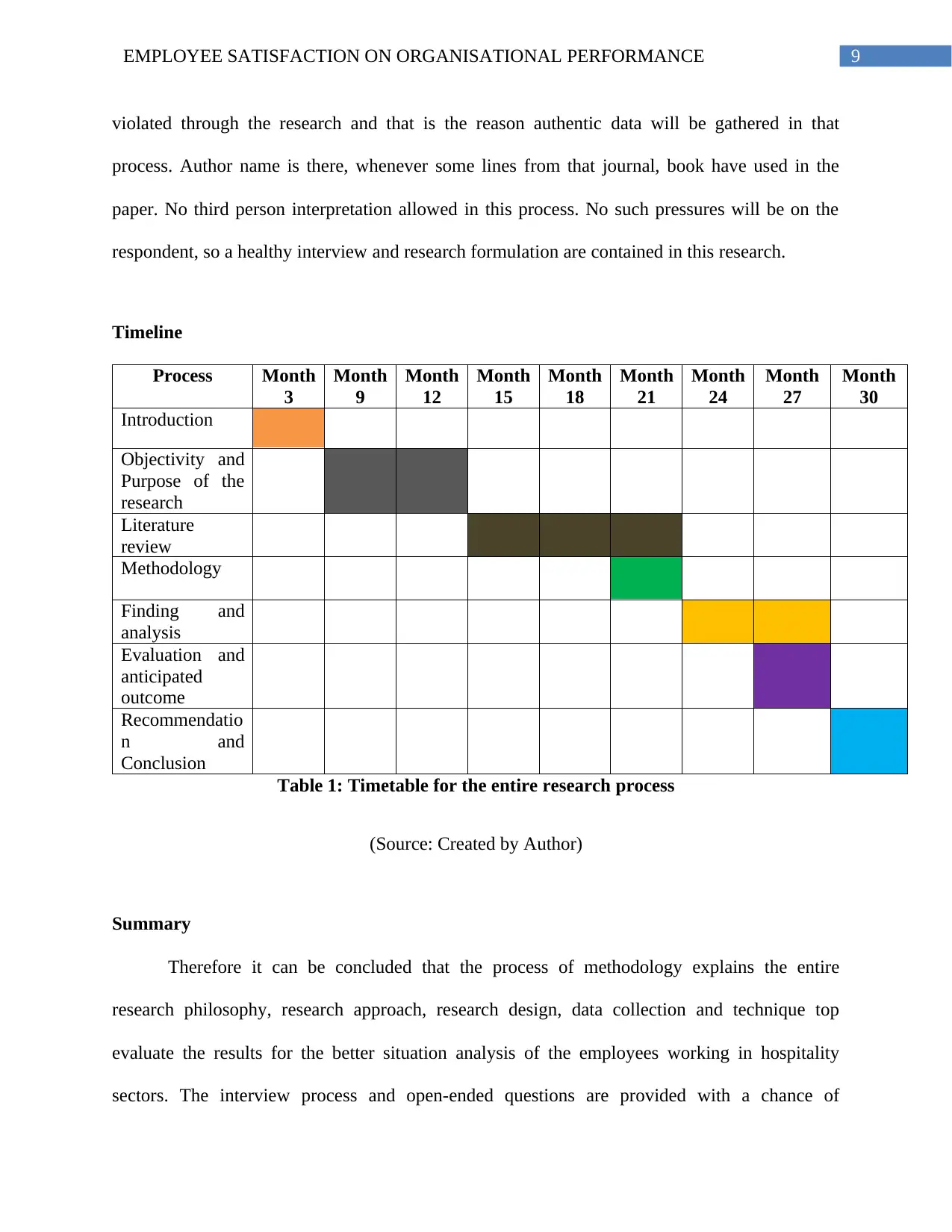
9EMPLOYEE SATISFACTION ON ORGANISATIONAL PERFORMANCE
violated through the research and that is the reason authentic data will be gathered in that
process. Author name is there, whenever some lines from that journal, book have used in the
paper. No third person interpretation allowed in this process. No such pressures will be on the
respondent, so a healthy interview and research formulation are contained in this research.
Timeline
Process Month
3
Month
9
Month
12
Month
15
Month
18
Month
21
Month
24
Month
27
Month
30
Introduction
Objectivity and
Purpose of the
research
Literature
review
Methodology
Finding and
analysis
Evaluation and
anticipated
outcome
Recommendatio
n and
Conclusion
Table 1: Timetable for the entire research process
(Source: Created by Author)
Summary
Therefore it can be concluded that the process of methodology explains the entire
research philosophy, research approach, research design, data collection and technique top
evaluate the results for the better situation analysis of the employees working in hospitality
sectors. The interview process and open-ended questions are provided with a chance of
violated through the research and that is the reason authentic data will be gathered in that
process. Author name is there, whenever some lines from that journal, book have used in the
paper. No third person interpretation allowed in this process. No such pressures will be on the
respondent, so a healthy interview and research formulation are contained in this research.
Timeline
Process Month
3
Month
9
Month
12
Month
15
Month
18
Month
21
Month
24
Month
27
Month
30
Introduction
Objectivity and
Purpose of the
research
Literature
review
Methodology
Finding and
analysis
Evaluation and
anticipated
outcome
Recommendatio
n and
Conclusion
Table 1: Timetable for the entire research process
(Source: Created by Author)
Summary
Therefore it can be concluded that the process of methodology explains the entire
research philosophy, research approach, research design, data collection and technique top
evaluate the results for the better situation analysis of the employees working in hospitality
sectors. The interview process and open-ended questions are provided with a chance of
Paraphrase This Document
Need a fresh take? Get an instant paraphrase of this document with our AI Paraphraser
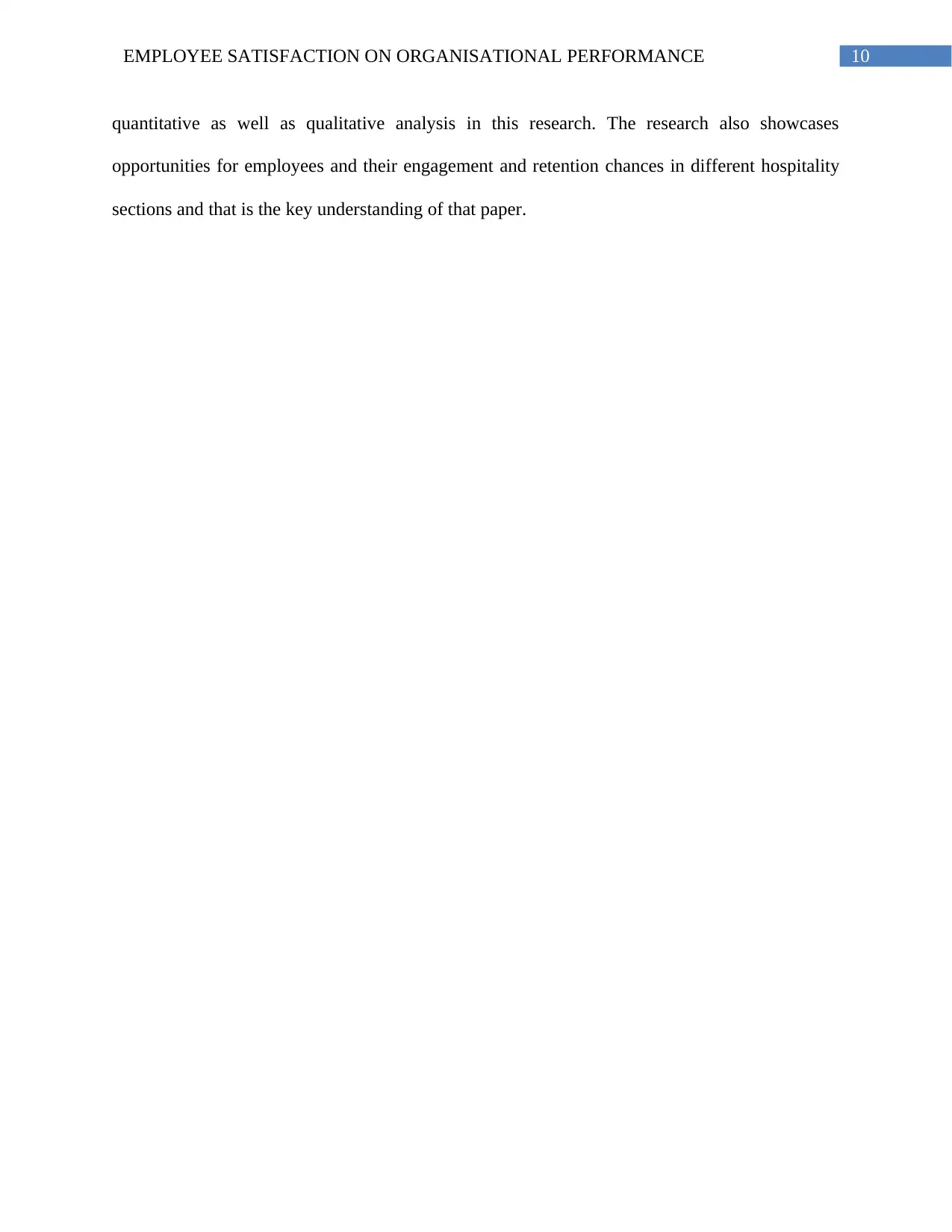
10EMPLOYEE SATISFACTION ON ORGANISATIONAL PERFORMANCE
quantitative as well as qualitative analysis in this research. The research also showcases
opportunities for employees and their engagement and retention chances in different hospitality
sections and that is the key understanding of that paper.
quantitative as well as qualitative analysis in this research. The research also showcases
opportunities for employees and their engagement and retention chances in different hospitality
sections and that is the key understanding of that paper.
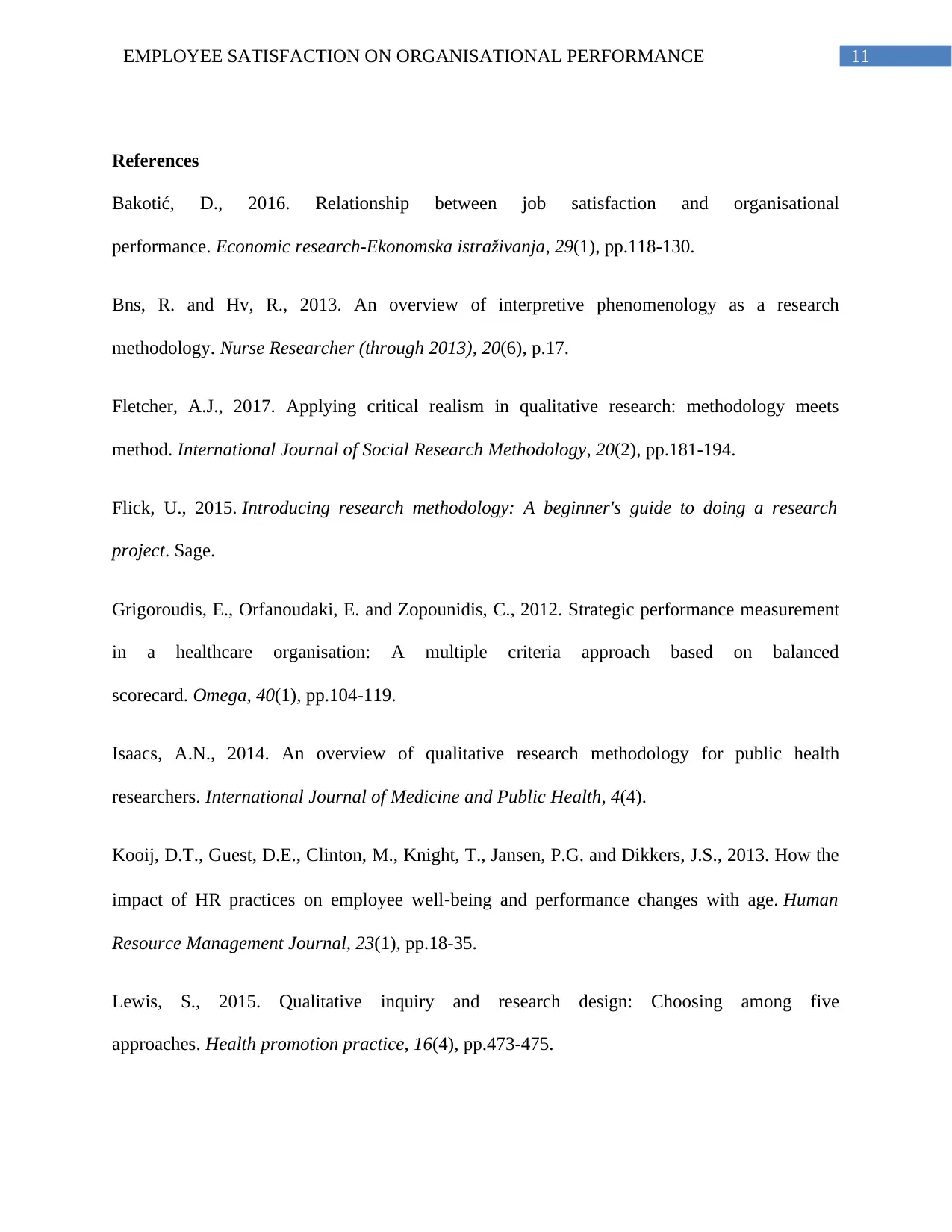
11EMPLOYEE SATISFACTION ON ORGANISATIONAL PERFORMANCE
References
Bakotić, D., 2016. Relationship between job satisfaction and organisational
performance. Economic research-Ekonomska istraživanja, 29(1), pp.118-130.
Bns, R. and Hv, R., 2013. An overview of interpretive phenomenology as a research
methodology. Nurse Researcher (through 2013), 20(6), p.17.
Fletcher, A.J., 2017. Applying critical realism in qualitative research: methodology meets
method. International Journal of Social Research Methodology, 20(2), pp.181-194.
Flick, U., 2015. Introducing research methodology: A beginner's guide to doing a research
project. Sage.
Grigoroudis, E., Orfanoudaki, E. and Zopounidis, C., 2012. Strategic performance measurement
in a healthcare organisation: A multiple criteria approach based on balanced
scorecard. Omega, 40(1), pp.104-119.
Isaacs, A.N., 2014. An overview of qualitative research methodology for public health
researchers. International Journal of Medicine and Public Health, 4(4).
Kooij, D.T., Guest, D.E., Clinton, M., Knight, T., Jansen, P.G. and Dikkers, J.S., 2013. How the
impact of HR practices on employee well‐being and performance changes with age. Human
Resource Management Journal, 23(1), pp.18-35.
Lewis, S., 2015. Qualitative inquiry and research design: Choosing among five
approaches. Health promotion practice, 16(4), pp.473-475.
References
Bakotić, D., 2016. Relationship between job satisfaction and organisational
performance. Economic research-Ekonomska istraživanja, 29(1), pp.118-130.
Bns, R. and Hv, R., 2013. An overview of interpretive phenomenology as a research
methodology. Nurse Researcher (through 2013), 20(6), p.17.
Fletcher, A.J., 2017. Applying critical realism in qualitative research: methodology meets
method. International Journal of Social Research Methodology, 20(2), pp.181-194.
Flick, U., 2015. Introducing research methodology: A beginner's guide to doing a research
project. Sage.
Grigoroudis, E., Orfanoudaki, E. and Zopounidis, C., 2012. Strategic performance measurement
in a healthcare organisation: A multiple criteria approach based on balanced
scorecard. Omega, 40(1), pp.104-119.
Isaacs, A.N., 2014. An overview of qualitative research methodology for public health
researchers. International Journal of Medicine and Public Health, 4(4).
Kooij, D.T., Guest, D.E., Clinton, M., Knight, T., Jansen, P.G. and Dikkers, J.S., 2013. How the
impact of HR practices on employee well‐being and performance changes with age. Human
Resource Management Journal, 23(1), pp.18-35.
Lewis, S., 2015. Qualitative inquiry and research design: Choosing among five
approaches. Health promotion practice, 16(4), pp.473-475.
⊘ This is a preview!⊘
Do you want full access?
Subscribe today to unlock all pages.

Trusted by 1+ million students worldwide
1 out of 13
Related Documents
Your All-in-One AI-Powered Toolkit for Academic Success.
+13062052269
info@desklib.com
Available 24*7 on WhatsApp / Email
![[object Object]](/_next/static/media/star-bottom.7253800d.svg)
Unlock your academic potential
Copyright © 2020–2026 A2Z Services. All Rights Reserved. Developed and managed by ZUCOL.





